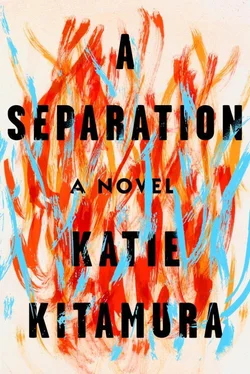She was on the verge of despair when he came to an abrupt stop and said, indicating the small terraced house before which they were standing, This is me. She stopped, almost too nervous to speak. He continued, Would you like to come in for a coffee? She immediately wondered why he didn’t ask her in for a drink instead, it was past eleven, a coffee was strange and even a little ambiguous but a drink is obvious, everyone knows what a man or a woman means when he or she says, Would you like to come in for a drink?
However, when she did not reply, he smiled and repeated the question, Would you like to come in for a coffee? This time, he leaned toward her as he spoke and smiled—she thought teasingly, so that she felt there was no longer any ambiguity, a coffee or a drink, what’s the difference, and she blurted out, I can’t, I have my period.
She was astounded to hear the words leave her mouth, she remembered that she had thought to herself, before she left her apartment, that although it wasn’t ideal at least it meant that she wouldn’t leap into bed with the man at once, thereby ruining everything. But now he stepped back, with an expression somewhere between amusement and disgust, as if to say, But I only asked if you wanted a cup of coffee, I didn’t inquire after the status of your uterus, the availability of your vaginal passage. In reality, he only said three words, Good night, then, before politely kissing her on both cheeks—she leaned, numb, into this formal and distant embrace—and disappearing into his terraced house, the door clicking shut behind him.
She was not surprised when he did not call. Her main regret, she said as she recounted the story to me, was that she could never go back to that wonderful restaurant, a mere ten-minute walk from her apartment. But what about the man himself, the attractive musician? Couldn’t she call him, make a joke of it—after all, they had been getting along well, he had asked her into his house, they liked each other. All she had done was refer directly to what they both knew had been on the table, what else does such an invitation imply, at such an hour, but eventual coitus? She shook her head vehemently, no, never. Even the thought was enough to make her feel sick. And besides, she added, I no longer desire him. The whole thing is impossible.
Stefano was still standing before me. Having ruptured the pretense that he didn’t know what I knew he knew, he nonetheless recovered quickly. His manner—which now seemed to say, Let us bring an end to these fabrications, I know that you know that I know, or something along those lines—made it difficult for me to take up or even respond to this transgression. I realized, belatedly, that Stefano must have known all along that my purported research was nothing of the kind, the flimsiest of excuses, he must have known from the beginning that I had come to Mani in search of Christopher.
Perhaps he had driven Christopher and guessed at our affiliation the moment I stepped into the back of his car. Or perhaps Maria had told Stefano, although Maria did not know everything about Christopher, she did not know, for example, that the absent husband was soon to be an ex-husband. Would she have been relieved, had she known it? Would she have been made hopeful, to learn that I had come to Gerolimenas to ask for a divorce, that I was cutting this man, essentially a philanderer, free? Would that have led her to imagine a future, marriage, a life together, with Christopher? Imagination, after all, costs nothing, it’s the living that is the harder part.
I saw that Stefano was perturbed, no longer by his slip of the tongue, but by the announcement of my departure, which was, after all, what had caused his small indiscretion, it was the true matter at stake here. It seemed to cause him dismay, perhaps the fact of my existence—a wife was no small thing and I was not even in the abstract, I was a material presence in the hotel, I had barely left these three days, my being there must have been a source of constant consternation to Maria—had made his argument more persuasive, after all, it was absurd to be hankering after a man who not only had abandoned you but was, by all appearances, being pursued by his wife.
Would she grow more hopeful, would my departure be interpreted by Maria as some ceding of ground? Although it might not be in the end to her, it might easily be to the woman in Cape Tenaro, or the next woman, there would always be a next, particularly with a man like Christopher. Was that why Stefano was so eager for me to stay? This was assuming that Christopher was at the root of their disagreement. Stefano continued, But you should not leave, there is still a great deal to see in the area, I could show you, there are many attractions that can be easily reached, now is a good time, during the low season, there are not so many tourists.
Now I felt a wave of pity—he was so desperate, he appeared to know that his powers of persuasion were, in this situation, even more limited than they had been in his argument with Maria, there was something absurd about his attempt to convince me, virtually a stranger, to prolong my stay, he knew it himself, he was aware that his words had no purchase. He came to a stop, and then stood in silence before me.
I’m sorry, I said, and my voice was more brusque than I would have liked, but there’s nothing to be done, I need to go back to London. I wish I could stay, I added, as if this might soften the blow, but he was already retreating, he had turned and walked away, out the front doors of the hotel, without stopping to say good-bye. I was baffled. I looked up and saw that Kostas was—of course—watching, that he had observed the entire exchange. He shrugged, Ignore him, he called out across the lobby, he is not having a good day.
6.

That evening, on what was to be my final night in Gerolimenas, I had dinner with Maria. It happened very naturally, although it was hard to think of a situation more awkward—the wife and the mistress, sitting across the table from each other, making conversation. The awkwardness was compounded by the fact that she was still working, she wore her uniform and said before she sat down that her shift would not end for another thirty minutes, and that staff were not to fraternize with guests, not under any circumstances.
Her words had the quality of a formal announcement and for a moment she merely stood before me. It had not turned out well, the last time she had consorted with a guest of the hotel—neither of us said this but it was as if we both had the thought at the same time, her forehead creased and she stood immobile, staring down at the table, one hand on the back of the chair. She had asked if she could join me, but she now looked as if she might change her mind. She didn’t, and at last she pulled the chair out and sat down.
I waited for her to say something. She must have had something to say—why else would she have asked to sit down, her manner when she did so was deliberate, as if she had been considering the action for some time, for some hours if not days, perhaps she was going to reprimand me for having eavesdropped on her conversation with Stefano—but she simply sat on the edge of her seat and looked around, she seemed anxious, perhaps she was worried that Kostas or someone else would appear and ask her what on earth she was doing. The waiters seemed not to notice her arrival, as if the sight of an employee sitting down to dinner with a guest was too bizarre to acknowledge.
I asked if she would like a glass of wine. She looked as if she were going to refuse, then shrugged and nodded. A glass of wine would be nice. I motioned to the waiter, who came to the table at once. He stood before me without looking at Maria, although they were colleagues and must have known each other.
Читать дальше












